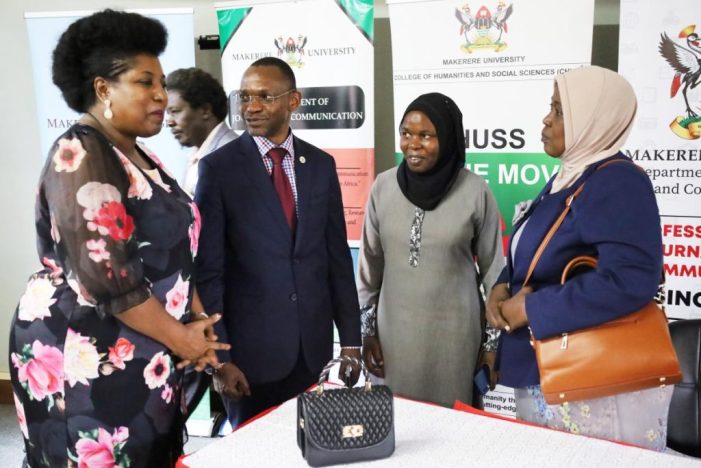Makerere University’s Department of Journalism and Communication on Thursday 20th October 2022 launched the Master of Strategic and Corporate Communication and the Master of Journalism and Multimedia with a call on Management and Government to elevate the department to a school of Journalism and Communication.
The department also reiterated the need for the university Management and government to support the department reposes the frequency for its training radio – the campus FM and to acquire equipment for practical teaching and learning.
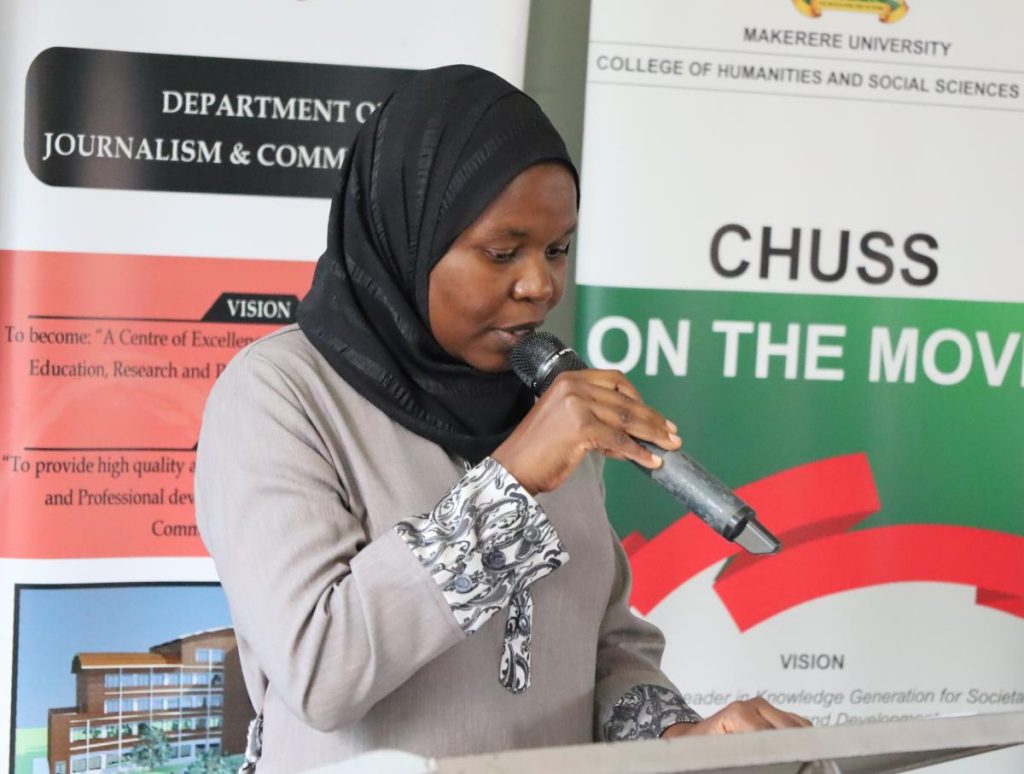
“We want to turn into a school of Journalism and Communication in the next five years. Management is helping us to revive the campus FM and we hope our efforts yield results in the near future. We want to start a multimedia studio, revive our radio, and start a television and a newspaper”. The Head of Department Dr. Aisha Nakiwala reported.
Recalling the evolution of the department from what she described as an endangered state, the Dean School of Languages, Literature and Communication Dr. Saudah Namyalo recognised the brains behind the establishment and growth of the department including Prof. Gorretti Nansanga and Dr. William Tayebwa.
Dr. Namyalo hailed staff for raising the name of the department to a level where it is recognised as the best department training journalists and communicators in the country and Africa.
The Department currently has s 13 academic staff members holding PhDs and two in the pipeline. All these 13 PhD have gone through the hands of these people, similarly one of the long serving members of the department is Dr. Adolf Mbaine. The challenge now is to move from PhDs and work towards becoming professors”, Namyalo emphasised.
As bigger strategy to revolve into a research led school and department, Namyalo reported that the school was still a number of writing a number of graduate programs adding that already one a masters in French language and French studies had been launched while another in Germany studies was underway.
Launching the programs, at the Senate Telepresence Conference Room, the Deputy Vice Chancellor in Charge of Academic Affairs Assoc. Prof. Umar Kakumba hailed the department and all stakeholders for the laborious, rigorous and widely consultative process from the conception, development up to the final approval.
“Both programmes are timely in various ways. On one hand, they are an apt response to the critical need for practical skills in the market place where communication, as a crosscutting discipline, calls for specialized knowledge and abilities to support the functioning of any organisation or society.
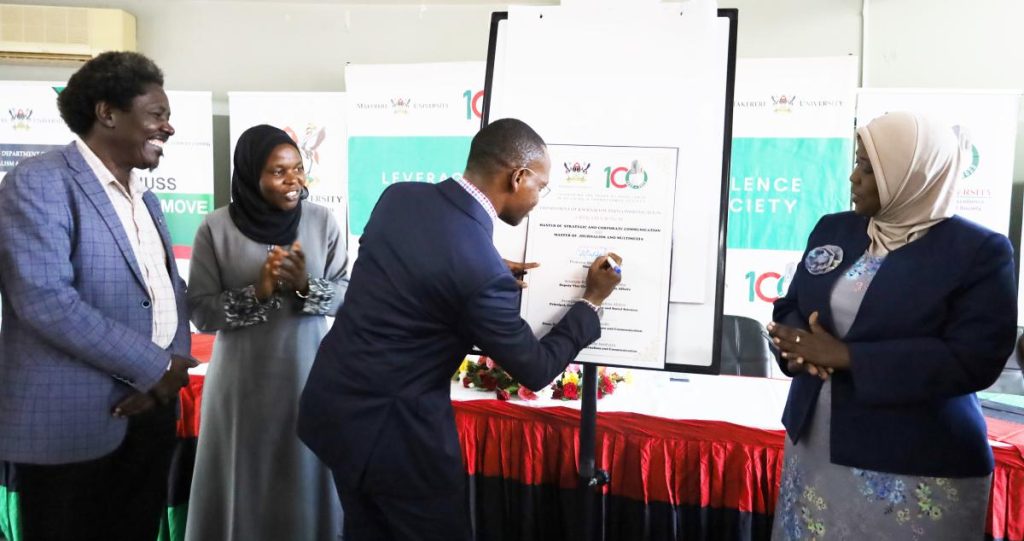
On the part of the media, as we all know, the field has evolved from traditional journalism as we knew it, to one of cutting-age innovation. For today’s journalists to be worth their name and calling, they must embrace the new skills and tools very fast”.
Kakumba noted that the two Masters programmes find the university at the heels of the centennial celebrations and at the threshold of its transition towards a research-led institution.
He commended the Department for leading in its field by not only equipping students with knowledge and practical skills, but also designing graduate programmes that include a rich research component aimed at building a community of highly trained researchers and professionals that can provide evidence based solutions to real problems in society.
“Our graduates from Makerere should be people that are sensitive to the needs in society, and who provide solutions. Strategic communication professionals, journalists, and the media are powerful resources for mobilizing the pubic and holding leaders at different levels accountable.
The Department of Journalism and Communication has provided leadership in this regard by arming students with tools that make them relevant in a rapidly changing media and communication environment, and a society that is desperate for transformative ideas and information”, Kakumba explained
Kakumba reassured the Department that management, will continue to support her growth so that, with adequate resources and clout as a unit, they continue to innovate and develop more programs that have a tangible positive impact on the industry and in society as a whole.
He said management had engaged the Minister for ICT and National Guidance Dr. Chris Baryomunsi on the restoration of the campus frequency adding that the minister had already directed the Uganda Communications Commission to expedite the process.
Importance of Strategic and Corporate Communication
While delivering the key note address, Alumnus Gloria Sebikali from the Uganda Petroleum Authority stressed the importance of strategic communication in translating community, societal and country’s aspirations to reality.
Strategic Communication according to her, must support the achievement of the organisation’s goals and the country’s development aspirations, address the challenges related to creating awareness in order to achieve sustainable development and the related global development issues.
It must focus on strategies to address the information gaps, misinformation, and disinformation. And it is important to link the classroom learning to present day practice, Use the alumni to enhance the curriculum as the programme is implemented.
Unlike the past, Sebikali observed, strategic communication is beginning to take center stage with ministries, private sector institutions and parastatals establishing independent and professional communication units benchmarked on other corporate entities.
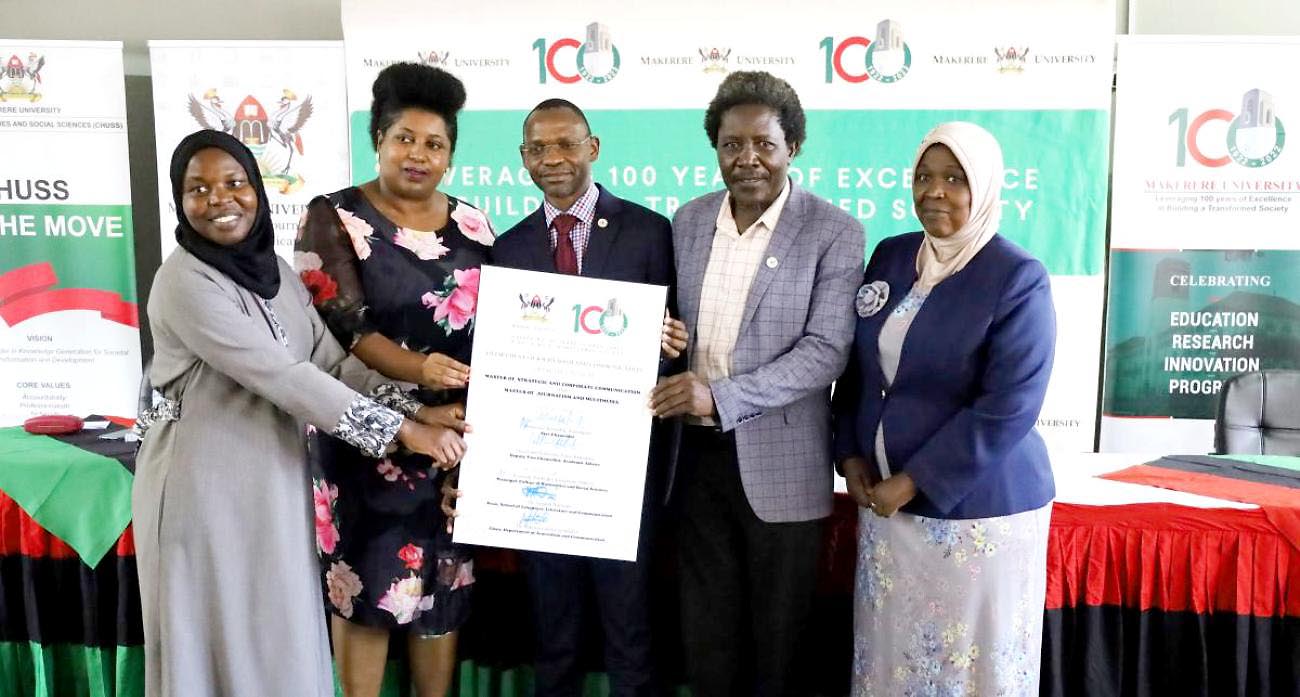
“The communications function is increasingly part of management, and is gaining recognition as a strategic function. This makes the Masters programme in Strategic and Corporate Communication even more relevant.
The programme must prepare and enable communication professionals to understand the role of strategic communication in achieving organisation objectives, and the overall development aspirations of the country”, She explained
Sebikali explained that with the rise in technological developments and the various new media platforms, strategic communication offers pathways for institutions to remain responsive to the changing needs of stakeholders, and the communication landscape.
“For instance, we no longer have to wait for the dailies to receive breaking news, or a report to hear about an incident on the community or the 8pm news to hear about what is happening.
She observed that the COVID 19 pandemic showed us the possibilities, and importance of technology in facilitating communication. Just think of how many webinars, e-conferences, and meetings you attended prior to the pandemic. Even with the lifting of the lock downs, live streaming and e-events continue to be the norm. Technology has, therefore, changed the communication landscape, and the profession must be even more dynamic in utilizing technology to achieve strategic communication”, She added
Strategic Communication according to Sebikali is a broad field which integrates different specializations in the communication arena, including marketing and advertising, brand management, media relations, public relations and stakeholder management, social responsibility, or corporate social investment.
Equally important is that it explores the capacity of all organizations – not only corporations, but also not-for-profit organizations (including advocacy and activist groups) and government—for engaging in focused communication while ensuring that communication is purposeful and contributes to the achievement of the organization’s mission.
The MA in Strategic and Corporate Communication, Sebikali elaborated has a task of equipping the students with the knowledge and skills to further cement the value and place of communication as a strategic function within all institutions. We must strive to maintain our seat at the table, not only by demanding for it, but by showing the value of communication in achieving the organisation’s strategic goals and objectives.
She noted that the programme incorporates the different facets of strategic communications, with a mix of theory, research, practice, and multimedia approaches with the current trends related to global communication and health and environment communication covered.
“I want to also emphasize the importance of public diplomacy, as an added area for consideration. This course must equip the students with the required skills and knowledge that are in tune with the current issues, and technological developments.
We all know that the world is a global village. Therefore, for communication to be strategic, it must also be in tune with the current issues that the world is grappling with, many of which are summarised in the sustainable development goals”, Sebikali said.
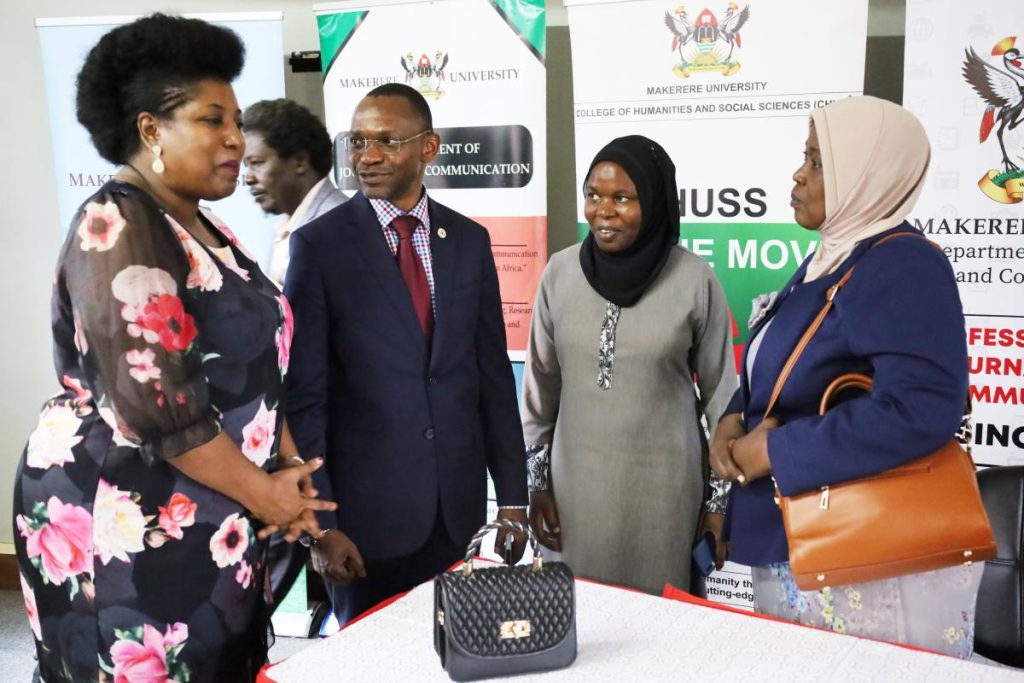
Strategic communication Sebikali emphasised must address the challenges related to creating awareness in order to achieve sustainable development. It must also address the information gaps, the misinformation and disinformation.
Some of the issues she highlighted include the oil and gas sector, discussions related to climate change, the energy transition, environment and biodiversity protection, technological developments and social issues that are taking center stage.
Sebikali stated that it is important that the curriculum goes beyond building knowledge in the classroom, to giving the students practical skills to enhance their professional visibility. Accordingly, she explained, it is not enough to be equipped with knowledge, but be able to apply the knowledge to address communication challenges, and bring additional value.
In addition, she went ahead to state that the curriculum should also emphasize practical training and the current practice of strategic communication in different spheres and sectors. For Masters’ courses, whereas there is no space or time for internships, the faculty can encourage workplace mentors.
The Department of Journalism according to Sebikali was home to many professionals that are leading strategic communication in different entities, and can, therefore, be resourceful in linking the classroom learning to present day practice. Use the alumni to enhance the curriculum as you implement the programmes.
As the country advances to middle income status, strategic communication is required to translate the country’s development aspirations across all sectors and to all stakeholders. We therefore must play our role, and continue preparing both the current and next generation of communicators to be up to the task.
The Master of Arts in Strategic and Corporate Communication
The “Master of Arts in Strategic and Corporate Communication”, was be implemented this academic year 2022/2023. The programme is designed to develop academic knowledge as well as practical skills in the practice of strategic communication that includes public relations, corporate communication, integrated marketing communication, and development communication. The programme was conceived as a result of the ever-increasing demand for advanced training in the aforementioned areas of strategic communication.
Whereas the current approach to communication training at graduate level has tended to focus on journalism and media studies, there has been a growing demand for graduates who are competent in behavioural, social, and development communication aimed at addressing livelihood conditions at different levels of society. Such graduates would be better prepared to apply their communication skills and knowledge to support efforts to improve livelihoods in areas such as health, environment, agriculture, population, education, economics, human rights, and several others.
Similarly, the growth of the corporate and public sectors in Uganda and beyond, over the last decade, has brought communication at the forefront of business and public service delivery. Companies and organizations in the public, private and non-governmental sectors are investing more of their resources in a variety of strategic communication approaches as a means of promoting their values, marketing their products and services, engaging with their stakeholders and clients, engaging with communities through corporate social responsibility, and building as well as maintaining their public image.
In offering this programme, the Department recognizes that the many strategic communication approaches referred to herein – public relations, corporate communication, integrated marketing communication, media relations and development communication – draw from a related set of theoretical and conceptual premises. This programme therefore aims to integrate the teaching of the above areas of communication practice so as to better prepare students for work in this dynamic profession.
Upon completion of the programme, graduates will be employed in a variety of jobs in the wide scope of strategic and social change communication. More specifically, graduates who complete this programme will be ready to earn employment in jobs such as: communication policy consultant, communication manager, public relations director, communication researcher, academic employee, corporate affairs manager, communication officers, advertising account managers, health educator, health communication planner, media planner, special event manager, social media content creator and manager among others.
The courses on offer include: Corporate Communication; Communication Ethics, Policy and Regulation; Communication for Development; Global Communication; Social Media Management; Media and Communication Research Methods; Media and Communication Theory; Health and Environment Communication; Integrated Marketing Communication; Information, Communication and Knowledge Management; Crisis Communication
The Master of Arts in Journalism and Multimedia
The programme “Master of Arts in Journalism and Multimedia”, was conceived to ensure that graduate students develop journalistic skills in a multimedia context. In so doing, the programme prepares students to respond to the new professional realities and to meet the expectations of the market.
With the advent on social media and new online tools, the field of journalism and multimedia has gained significant popularity and relevance in today’s rapidly changing world. This programme puts emphasis on the current and changing trends in the online journalism and multimedia world to allow students to connect better with ongoing and future demands in the industry.
On successful completion of this programme, graduates will have acquired the intellectual ability, knowledge and skills in various aspects of journalism, multimedia and communication. Graduates will be able to engage critically with contemporary issues relevant to the political, social and cultural roles of journalism, media and communication in society. They would have the skills to investigate the quantitative and qualitative approaches necessary for analysing all aspects of journalism and media practice.
The programme targets practitioners in the areas of journalism and multimedia to enable them acquire advanced knowledge and skills to enhance their practice. It also aims to enlarge the cadre of people with the knowledge and skills to engage in academic inquiry, research and publication in the fast-growing field of journalism and multimedia.
Graduates of the programme will be ready to earn employment in jobs such as: print journalists, online journalists, broadcast journalists for radio and television, media consultants, media policy and regulation consultants, research careers in journalism and multimedia, academic employees, corporate affairs managers, communication officers, media planners, social media content creators and managers among other emerging fields.
The courses on offer include: Digital Journalism and Communication; Business and Financial Journalism; Global Journalism; Communication Graphics; Investigative and Precision Journalism; Media, Governance and Human Rights; Media Economics; Media and Communication Research Methods; Advanced Multimedia Production; Information, Communication and Knowledge Management; Media and Communication Theory; Media Policy and Institutions.

